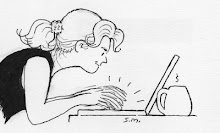"Should we?"
"Nah."
"Okay."
And then one day it was:
"Let's do it."
"Okay, let's do it."
And so we got married.
At least that's the Reader's Digest version of the story. I've been trying to come up with one ever since the day two weeks ago when we stood barefoot on a beach in Provincetown, Massachusetts, just us and the justice of the peace and seagulls for witnesses, and said, "I will."
Reactions from family and friends had a theme: "You're kidding!" "You did WHAT?" "No way!" "You?" And various stories of falling off pieces of furniture when they heard the news.
My friend Lauren said, “I thought it was illegal for heterosexual couples to get married in Provincetown.”
And from my friend Gary: “I like that you call him 'My Beloved.' Now that you're married, will he be demoted to ‘Husband’?”
And everyone's inevitable question: “Had you planned this, or did you decide on the spur of the moment?”
We've been together for almost 10 years, so obviously the subject has come up. We didn't shudder at the idea, but we didn't feel incomplete without it. There were no when-will-you-make-an-honest-woman-of-my-daughter discussions, although seriously, that would have been darn cute.
Occasionally since leaving L.A. and moving to New York full time, my Beloved and I talked about logistics—like how much easier it is to own property together if you're married. But also about finances—like how there could be negative tax implications if we got married. We'd shrug and drop the topic.
Then there we were one Saturday watching The Bourne Ultimatum when I went over and gave my Beloved a hug. He looked at me and said, "Screw the finances. Let's do it," and I said, "Okay, let's do it."
And there you have it. Two lives changed in the span of a commercial break.
Four weeks later, we drove to the Provincetown Town Hall—rather, its temporary headquarters in a trailer up next to the cemetery—and applied for our marriage license. It was a pretty straightforward process; I think they asked for our first and last names. And we skirted the three-day waiting period by driving down to the Barnstable Family and Probate Court to apply for a waiver.
That process involved filling out a “Marriage Without Delay” form, forking over $65, and spending the 10-minute wait watching divorce proceedings in the courtroom. Clever ploy, Massachusetts! But ha ha—we were not deterred! The judge signed our waiver and the jovial Irish bailiff handed it over to us…after extracting a pledge that we weren't Yankees fans.
On the night before the big day, I sat on the bed in our rented Provincetown condo and called The Child at college to let her in on the secret—the only person to know ahead of time. She offered us her good wishes, said she was happy we were doing this, and gave us her blessing: "Finally, you're respectable!"
All that night, I listened to the rain and the wind rattle the windows. I wondered if I was brave enough to get married on the beach in a downpour. And we woke up to the sun blazing in an intensely blue sky. Thank you, universe.
At noon, we stood on the beach in that magic Cape light, looking across the bay at the lighthouse and Pilgrim Monument and MacMillan Wharf, I in my thrift shop dress and Stan in his Old Navy shirt. Before us stood the kind, warm, funny, compassionate justice of the peace, Susan Marcus, whom fate and Google had brought our way.
A wild wind swirled around us, so strong that we could barely hear our own words as Stan and I read aloud the poetry we'd chosen for the occasion—Stan from Walt Whitman:
...Will you give me yourself?
Will you come travel with me?
Shall we stick by each other as long as we live?
...and me from Shakespeare:
Let me not to the marriage of true minds
Admit impediments. Love is not love
Which alters when it alteration finds...
We read our vows to each other, comic yet sincere. We picked up fistfuls of sand and symbolically poured them together into one glass container—an olive oil cruet we bought at the Brewster General Store. We shared a glass of red wine, sweet and bitter. Tears streamed from my eyes, whether from emotion or wind.
And then it was done. We were married. He was my "husband." I was his "wife." Such odd words. We played with them like Play-Dough, rolling them around to see what we made of them. We wondered if we felt different. We don't, and we do.
"How's married life?" everyone asks now.
"It's superb," I say. "It's sweet."
And I believe my husband—still My Beloved—feels the same.





